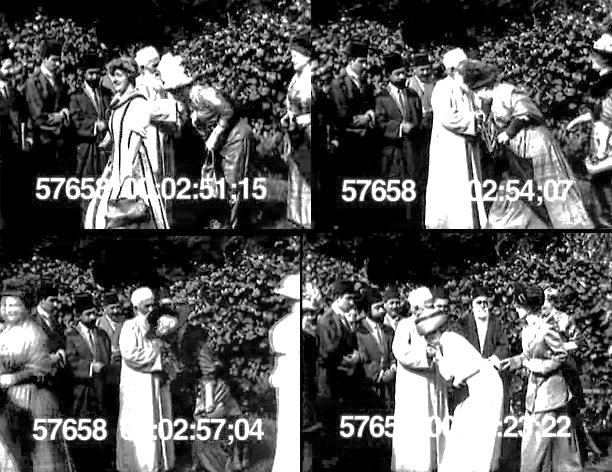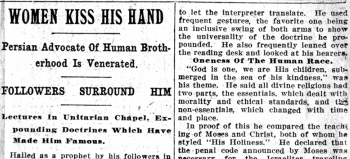Reason Judges That One Must Practice What He Preaches
If religion must be in conformance with reason, then one would expect that the leaders of a religion too act in accordance to reason and its judgemnets. One of the most obvious judgments of reason is that one must practice what he preaches. This act has also been emphasized on in the Holy Books sent by God. For instance:
O You who believe! Why do you utter what you do not do? It is greatly detested by God to utter what you do not do.[1]
Do you order the people to do good but forget about yourselves whilst you read the Book! Do you not use your reason![2]
You, then, who teach others, do you not teach yourself? You who preach against stealing, do you steal? You who say that people should not commit adultery, do you commit adultery?[3]
There are many instances in the Baha’i scripture that show that Baha’i leaders have preached what they have not practiced. Apart from the instances that we have mentioned throughout the book and are related to the twelve principles, we will mention a few other samples here:
a- Prohibition of Kissing Hands
Bahā’u’llāh writes in the Aqdas:
The kissing of hands hath been forbidden in the Book. This practice is prohibited by God, the Lord of glory and command.
This law has been completely ignored by Bahā’u’llāh and `Abdu’l-Bahā and they freely allowed anyone who wanted to kiss their hands. Here are a few examples:
“The inhabitants of the quarter in which Bahā’u’llāh had been living, and the neighbors who had gathered to bid Him farewell, came one after the other,” writes an eye-witness, “with the utmost sadness and regret to kiss His hands and the hem of His robe, expressing meanwhile their sorrow at His departure . . .”[4]
Until it was time to leave and he kissed (`Abdu’l-Bahā’s) blessed hand.[5]
With great sincerity one would kiss (`Abdu’l-Bahā’s) blessed hand and another would hold his skirt.[6]
There is a video from `Abdu’l-Bahā’s journey in America that clearly shows women kissing his hand:

The hand kissing in America attracted so much attention that the title of an article in the newspaper, The Baltimore Sun, November 12 1912 was “Women kiss his hand”. This is how it was described:
With condescension, he greeted his followers as they were presented by the interpreter, Dr. Ameer U. Farewed, a Persian and a graduate in medicine of Johns Hopkins University. “Oh, I am so glad to see you,” was uttered in tones of reverence by the women as they bowed before him and kissed his wrinkled hand.[7]

Baha’is try to justify these acts by claiming a specific kind of kissing was meant, or the kissing that is equal to submission has been prohibited. This whilst Bahā’u’llāh’s words elsewhere show that any kind of kissing the hand is prohibited. For instance he says:
God is my witness! Had it not been in conflict with that which the Tablets of God have decreed, I would have gladly kissed the hands of whosoever attempted to shed my blood in the path of the Well-Beloved.[8]
b- Where to Bury the Dead
The Baha’i law for Burial states:
It is forbidden you to transport the body of the deceased a greater distance than one hour’s journey from the city . . . The spirit of Bahā’u’llāh’s law is for the deceased to be buried near where he or she dies.[9]
This is how the Burial was performed for the Bāb on the orders of Bahā’u’llāh and `Abdu’l-Bahā:
As observed in a previous chapter the mangled bodies of the Bāb and His fellow-martyr, Mīrzā Muḥammad-`Alī, were removed, in the middle of the second night following their execution, through the pious intervention of Ḥājī Sulaymān Khān, from the edge of the moat where they had been cast to a silk factory owned by one of the believers of Milān, and were laid the next day in a wooden casket, and thence carried to a place of safety. Subsequently, according to Bahá’u’lláh’s instructions, they were transported to Ṭihrān and placed in the shrine of Imām-Zādih Ḥasan. They were later removed to the residence of Ḥājī Sulaymān Khān himself in the Sar-Chashmih quarter of the city, and from his house were taken to the shrine of Imām-Zādih Ma`ṣūm, where they remained concealed until the year 274 1284 A.H. (1867–1868), when a Tablet, revealed by Bahā’u’llāh in Adrianople, directed Mullā `Alī-Akbar-i-Shāhmīrzādī and Jamāl-i-Burūjirdī to transfer them without delay to some other spot . . . Ḥājī Shāh Muḥammad buried the casket beneath the floor of the inner sanctuary of the shrine of Imām-Zādih Zayd, where it lay undetected until Mīrzā Asadu’llāh-i-Iṣfahānī was informed of its exact location through a chart forwarded to him by Bahā’u’llāh. Instructed by Bahā’u’llāh to conceal it elsewhere, he first removed the remains to his own house in Ṭihrān, after which they were deposited in several other localities such as the house of Ḥusayn-‘Alīy-i-Iṣfahānī and that of Muḥammad-Karīm-i-‘Aṭṭār, where they remained hidden until the year 1316 (1899) A.H., when, in pursuance of directions issued by ‘Abdu’l-Bahā, this same Mīrzā Asadu’llāh, together with a number of other believers, transported them by way of Iṣfahān, Kirmanshāh, Baghdād and Damascus, to Beirut and thence by sea to ‘Akkā, arriving at their destination on the 19th of the month of Ramadān 1316 A.H. (January 31, 1899), fifty lunar years after the Bāb’s execution in Tabrīz.[10]
This one hour limit, changes to about 50 years and thousands of kilometers when applied to the Bāb.
c- Noah and the Flood: Symbolical or Reality
Shoghi tells his followers to believe in a symbolical flood and Ark in the time of Noah:
The statement in ‘Seven Days of Creation’ certainly cannot be considered authoritative or correct. The Ark and the Flood we believe are symbolical.[11]
This is while Bahā’u’llāh clearly refers to the flood as a cause for the destruction of many historical records:
Manifestations . . . were dispatched in the first centuries and invited the people to the truth. But because of the disturbances and changes in the world some of their names and sayings have been lost. In the books, the flood has been mentioned and in that event everything that was on earth was drowned including history records and other things. Furthermore, there have been many revolutions which have annihilated (the records) of some events . . . [12]
Here is the official distorted Baha’i translation that when one reads does not think he is referring to the flood:
Manifestations . . . have been sent down from time immemorial, and been commissioned to summon mankind to the one true God. That the names of some of them are forgotten and the records of their lives lost is to be attributed to the disturbances and changes that have overtaken the world. Mention hath been made in certain books of a deluge which caused all that existed on earth, historical records as well as other things, to be destroyed. Moreover, many cataclysms have occurred which have effaced the traces of many events.[13]
[1] Quran 61:2–3
[2] Quran 2:44.
[3] Romans 2:21-22 (New International Version).
[4] Shoghi Effendi, God Passes By, p. 181.
[5] Maḥmūd Zaraqānī, Badā’i` al-āthār, vol. 2, p. 31.
[6] Maḥmūd Zaraqānī, Badā’i` al-āthār, vol. 2, p. 340.
[7] http://centenary.bahai.us/news/women-kiss-his-hand (retrieved 20/1/2014)
[8] Helen Bassett Hornby, Lights of Guidance: A Bahā’ī Reference File, chap. XLI, no. 1716.
[9] Bahā’u’llāh, Muntakhabātī az āthār Ḥaḍrat Bahā’u’llāh, pp. 115–116.
[10] Bahā’u’llāh, Gleanings from the Writings of Bahā’u’llāh, p. 174.
[11] Bahā’u’llāh, Gleanings from the Writings of Bahā’u’llāh, p. 102.
[12] Bahā’u’llāh, The Kitābi Aqdas, p. 230.
[13] Shoghi Effendi, God Passes By, pp. 273–274